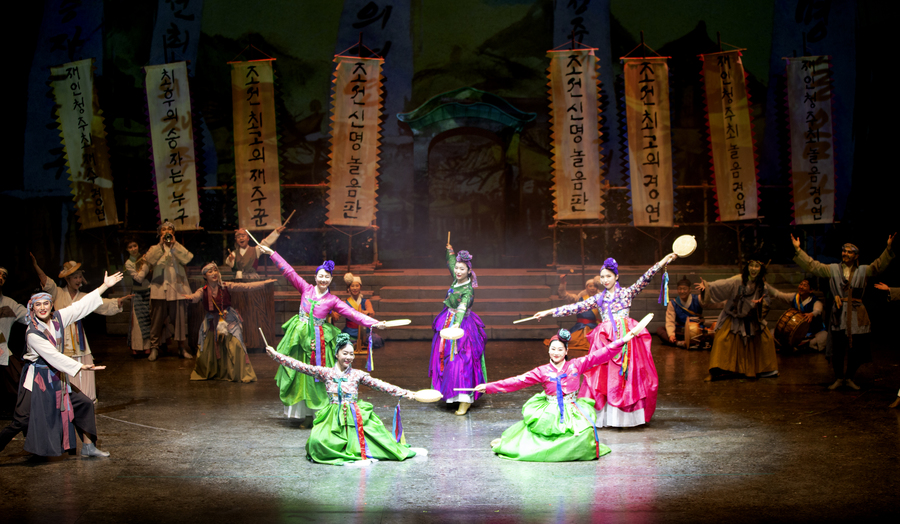Interview: Angella Kwon on Korean Season
Looking ahead to the eighth official season at the Edinburgh Fringe, Artistic Director Angella Kwon discusses why audiences continue to embrace work from South Korea

“Twenty-something years ago, people had no idea what to expect when they heard the name ‘Korea’,” Angella Kwon says. We’re currently together in Seoul, where Kwon lives and works as the Artistic Director of AtoBiz, the company that has been responsible for promoting Korean culture and arts worldwide since 1999. “Audience members would often ask if we were from China or Japan,” she continues, “because our country’s name wasn’t well recognised in terms of culture and arts. Despite this, the response from Fringe audiences has been overwhelmingly positive from the beginning.”
Since 2015, Kwon has been producing the Korean Season at the Edinburgh Festival Fringe in collaboration with Assembly Festival, becoming a key figure in the presentation of traditional and contemporary Korean performance, art, and literature at the Fringe. “Our initial goal was to showcase the diversity and richness of Korean cultural arts on a global stage, fostering cultural exchange and mutual appreciation,” she explains. In the years since, the Korean Season has become a staple of the Fringe landscape, annually bringing some of the most exciting and innovative work from the region in East Asia.
“Since the successful launch of the first Korean Season at the Fringe in 2015, it has grown in brand value each year,” she says. “While our core mission remains unchanged, the scope of the Korean Season has expanded to include a broader range of genres and more interactive experiences.” Previous hits have included the popular South Korean acrobatic cooking adventure Chef, multi-faceted magic show SNAP and last year’s K-Pop comedy Kokoon.
“This evolution reflects the dynamic nature of both the Fringe and global arts culture, allowing us to continually surprise and delight international audiences while maintaining the essence of Korean heritage.”
This year’s Korean Season promises to continue in this vein, with four shows that represent different facets of Korean life and culture. ARI: The Spirit of Korea, which was the winner of the Best Physical Theatre Award at the 2023 Adelaide Fringe, is a musical that brings to life the story of Arirang – an old Korean folk song from over 600 years ago, originating from Jeongseon in South Korea's Gangwon Province. With Korean dance, martial arts and traditional Korean drumming mixed in with uplifting music and colourful storytelling, it’s a show that offers, "a profound emotional journey that echoes Korea's rich cultural heritage."
Other features of the Korean Season this year include Black and White Tea Room: Counsellor, which Kwon describes as “a powerful psychological drama that explores the profound conflicts faced by individuals in unstable political climates”. Elsewhere, Sleeper deconstructs traditional Korean dance and transforms it using modern dance language, while You&It: The Musical tells a poignant love story about a man who brings his deceased wife back to life using AI. “These shows exemplify the artistic excellence and cultural depth that the Korean Season aims to present at the Edinburgh Festival Fringe,” she says.
In addition to the main programme, this year’s Fringe will see the return of the Seoul Arts Awards, which were held for the first time in 2023. “This award celebrates the most diverse and outstanding performers in non-verbal performance genres, offering them the opportunity to perform in South Korea,” Kwon notes. “Winners are selected based on their creativity, technical skill, and emotional impact.” Last year’s winning performances included talent from Australia, Canada, the Netherlands, Spain, and Hungary, highlighting the importance that is placed by Kwon and her team on strengthening global cultural exchange.
As we look ahead to the 26th anniversary of Korean work first being shown in Edinburgh, I ask Kwon for her thoughts on the relevance of the Fringe as an international festival in our current climate. “The Edinburgh Fringe is still highly regarded in South Korea and is considered one of the most important festivals for artists to attend and participate in,” she tells me emphatically.
“For Korean artists, performing at the Fringe is often a significant milestone in their careers. The festival's reputation for celebrating creativity and diversity aligns well with Korea's dynamic and innovative arts scene, making it a valuable experience for Korean performers and cultural ambassadors alike.”
Arusa Qureshi's trip to South Korea was made possible by the Jeongseon County and Global Cultural Exchange Committee.
 The Very Best of the Edinburgh Festivals 2024
The Very Best of the Edinburgh Festivals 2024
 Review: Assembly Hall
Review: Assembly Hall
 Review: Orchestra of Sound
Review: Orchestra of Sound
 Review: After the Silence
Review: After the Silence